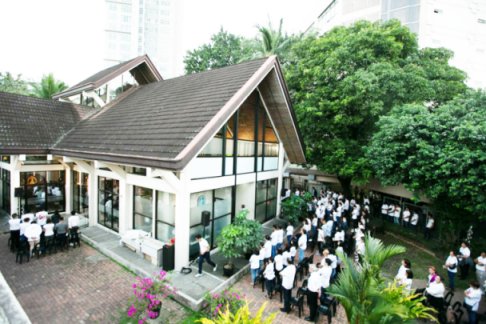(Bloomberg) — Philippine lawmakers rejected a bid by ABS-CBN Corp., the country’s largest media company, to secure a 25-year franchise, casting uncertainty over how the broadcaster will operate after two months of state-ordered shutdown.
ABS-CBN, the Philippines’ largest media company has asked the country’s top court to halt a government order shutting its television and radio stations.
A House of Representatives committee on Friday adopted a subgroup’s recommendation to deny ABS-CBN’s application. The company’s main television and radio stations have been shut since May when its franchise lapsed. The broadcaster can file an appeal, according to House rules, but it will be processed by the same panel. Seventy out of 84 lawmakers voted to deny the franchise bid.
“We remain committd to public service, and we hope to find other ways to achieve our mission,” ABS-CBN President Carlo Katigbak said in an emailed statement after the vote.
ABS-CBN shares have slumped 16% since May 5 when its television and radio stations went off air, while GMA Network Inc. rallied 26% to a two-year high on expectation its business will gain from its rival’s closure. ABS-CBN fell 2.6% at the 1 p.m. close of trading in Manila on Friday and the rejection of the franchise could cause the stock to collapse, said Rachelle Cruz, an analyst at AP Securities Inc.
ABS-CBN’s shutdown has affected 11,000 employees, and has cost the network as much as 35 million pesos ($707,000) in daily advertising revenues. The broadcaster’s “highly politicized” closure may deter foreign investments in the Philippine telecommunications sector, Fitch Solutions Inc. said in July 7 report.
Nail in Coffin
Often the target of President Rodrigo Duterte’s attacks for alleged bias, ABS-CBN also has a pending petition before the Supreme Court questioning its closure. Duterte remains neutral on the issue and recognizes Congress’s sole prerogative on franchises, his spokesman Harry Roque said Friday.
“This is the final nail in the coffin,” said Manny Cruz, an analyst at Papa Securities Corp. “ABS-CBN should just wait for Duterte’s term to end before seeking a franchise for another application under the current dispensation will likely get rejected again.”
Duterte has also attacked Philippine Daily Inquirer and Rappler Holdings Corp. for their reporting on his drug war that has killed thousands. The Southeast Asian nation ranked 136th out of 180 nations this year in Reporters Without Borders’ World Press Freedom Index, continuing a decline for the past three years under Duterte.
Human Rights Watch said Congress’ refusal to renew the permit of ABS-CBN “is a grievous assault on press freedom in the country” unseen since 1972 when the late dictator Ferdinand Marcos shut down the network and other media outlets. Vice President Leni Robredo said the decision will have a “chilling effect” on the press, leave thousands without work and hamper the flow of timely information.
House Speaker Alan Peter Cayetano on Thursday said the franchise decision is not about press freedom, but a check on businesses supposedly using public airwaves for private gain.
Congress has sole authority in the Philippines to grant broadcast licenses, but lawmakers in the Lower House, who are overwhelmingly allied with President Rodrigo Duterte, have declined to act on bills seeking the renewal of ABS-CBN’s permit. Duterte has repeatedly stated his disdain for the network and the family who own it.
Critical coverage of the government’s controversial war on drugs has angered the Philippine leader, but his gripe with ABS-CBN predates that, going back to the 2016 presidential election when he accused the network of refusing to run a number of his campaign’s political ads.
Duterte accepted an apology from ABS-CBN President Carlo Katigbak in a Senate hearing in February. During those proceedings Philippine Justice Secretary Menardo Guevarra said the government could issue provisional authority to allow ABS-CBN to continue broadcasting while the network waited for official legislative approval of its license.
On Sunday, however, as journalists marked World Press Freedom Day, the Philippine government’s top lawyer, Jose Calida, threatened to charge regulators at the National Telecommunications Commission (NTC) with graft if they went ahead with granting ABSCBN a temporary permit. Calida had also filed a case asking the Supreme Court to invalidate the media giant’s license. NTC officials have said they’ve no choice but to follow the law.
Media organizations and press freedom advocates call the order for ABS-CBN to stop broadcasting an attack not only on the company, but on freedom of speech and the country’s fragile democracy.
“The order threatens press freedom at a time when the public needs an unfettered press the most,” the Foreign Correspondents Association of the Philippines said in a statement. “As the Philippines reels from the fallout of the coronavirus pandemic, ABS-CBN’s critical eye is needed now more than ever to help inform the public.”
ABS-CBN is not the first news organization to be on the receiving end of pressure from Duterte’s government. Maria Ressa, who was a correspondent for CNN International and now runs the Manila-based online news service Rappler, is facing close to a dozen court cases.
Ressa told “60 Minutes” last year that she’s been threatened not just with imprisonment, but rape and even death for her reporting on Duterte’s drug war.
Separately, Ressa told CBSN that Duterte’s policies were an attempt to silence and manipulate the media to pervert the course of democracy, and she called it “a cautionary tale for the United States.”

 VIA Times – July 2020 Issue Vital News, Vibrant VIews for Asian Americans in Chicago & Midwest
VIA Times – July 2020 Issue Vital News, Vibrant VIews for Asian Americans in Chicago & Midwest

